Letter 1
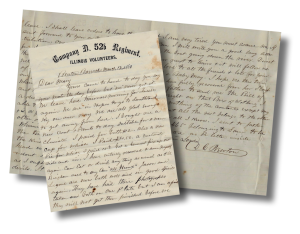
Co. D, 52nd Reg. Illinois Vols.
Benton Barracks [St. Louis, Mo.]
March 12, 1862
Dear Mary,
Yours came to hand today. You say you wrote the day before but “we” never got it. We leave here tomorrow morning for Tennessee again. We are in hopes to go to Smithland, Kentucky, on our way. We are all glad enough to get away from here. I bought me a new coat & pants today suitable for a warm climate. I paid for both $12. Also a new cup for which I paid $4.50, a custard pie for which I paid 15 cents. Got a general fix up outside and in. I have entirely recovered & am myself again. Can eat or drink anything as usual as Old Bingham used to say, am “all hunx.”
Jason and Legore [Prindle] are now both well and in good spirits again. They have had their photographs taken both on one plate but I am afraid they will not get them finished before we leave. I shall leave orders to leave them sent forward to you or Mr. Gammon for distribution. One is for you, one for Mr. Gammon, one for Lucy, one for Grandmother, At least this is as I understand it. The negative looks well & I think you will get good pictures of the boys. The 4 cost $3.50. I pay for one for us, you can get a frame for it sometime when Father goes to Chicago.
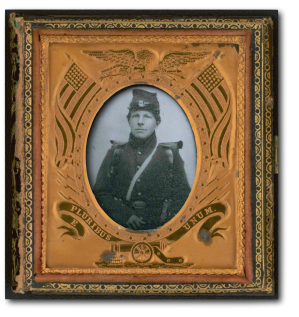
I have made out the papers for Jim Kelly & he will get a discharge from service. He has not been able to do any service for some time back & is a fit subject for one. I have 6 or 8 other ones that ought to be discharged. Whining miserable poor critters all the time complaining. I am one of the kind that always hold up my head until I am down down & don’t know as I have as much sympathy as I ought to have for the poor whining devils. It is nearly 10 o’clock tonight & I am very tired. You must excuse me if I can. I will write you a good long letter on the boat going down the river. Direct your next to Cairo & it will follow us. My love to all the friends & lots for yourself & Baby May. I hope ere this time she has fully recovered from her illness.
Tell Father to send me the Bill of the freight on that box of clothing. I know nothing of the contents except my overcoat. All the rest belongs to the other boys for all I know. I sent to Father today $65 belonging to same to be distributed as per letter inside.
Yours in love, — D. C. Newton
Letter 2
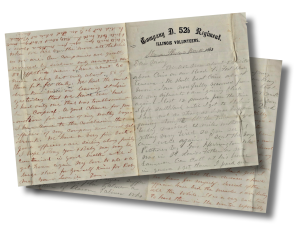
Co. D, 52nd Reg. Ill. Vols.
Steamer Florence
March 14, 1862
Dear Mary,
We are now about 50 miles above Cairo on our road to Fort Henry, Tennessee. We shall be at Cairo about noon. I am now fully recovered from all my ailments & am gaining flesh again. I lost 12 pounds from the time I left Smithland until I got to St. Louis. I am not as strong as I was but am gaining strength all the time. I yesterday marched 4 miles without getting very tired so you see I am well again.
I sent the boys [Jason & Legore Prindle] pictures by Gus Harrington who was in St. Louis. Father or Mr. Gammon can call at his home in Geneva & get them. I paid one dollar towards them, They cost 3.50 for 4. I want you to take your choice & get the best one as I paid for your doing so, They are splendid pictures of the boys—as good as you often get. The boys are both well now.
I heard from Jim [Kelly] yesterday. He is better & will go with us when we get there to Smithland [Ky.]. We shall go there & then back to Paducah & up the Tennessee River. The boys will write you how they want the pictures distributed.
I left 3 men in the hospital at St. Louis & one deserted. We leave one at almost every place we go. One deserted at Chicago & one at Quincy. All the companies suffer the same [ ]. John Palmer, a brother of Aaron Palmer who was a member of my company, died at St. Louis last Sunday. This is the 1st one I have lost by death. His wife is at Smithland. I can’t help pitying her very much. She is a sister of Dave Gillet of Batavia.
Jim Kelly has all the papers for his discharge & will get it. I think he is good for nothing anyhow—his health has been so poor. Ed Blanchard is feeling awfully because I won’t give him his. Several of the officers have had the measles & are ailing all the while. It is a very bad time to have them in the winter—especially when we are on the move all the while as we are. Our companies are greatly reduced by sickness, only averaging about 50 effective men. I have about 60 men along but only about 50 of them fit for duty. We had the most drunken men on leaving St. Louis yesterday that we have ever had. I had only one that was troublesome & he is a corporal. A good chance for promotion for some of my worthy boys. I have come to the conclusion that officers of my company must not get drunk.
We have a very fine boat & good officers & are sailing along finely. I hope & pray you and Baby May may be continued in good health until I get home again. My love to all & a large share for yourself. Kiss for Baby May. Your loving husband, — Don
I will write you again from Smithland, I guess, & will talk with Jim Kelly about what you wrote. He did not go to see Ted while at Batavia. — Don
Letter 3
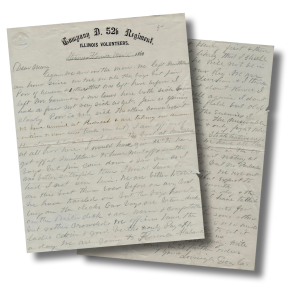
Co. D, 52nd Reg. Ill. Vols.
Steamer Florence
March 15, 1862
Dear Mary,
Again we are on the move. we left Smithland [Ky.] an hour since. We took on all the boys but Jim [Kelly], [Thomas] Poor of Geneva, & 1 other that was left here before. I left Mr. Gammon & Mr. [Samuel] Guss here both sick. Gammon had a fever—not very sick as yet. Jim [Kelly] is gaining slowly. [Thomas] Poor is very sick. The others convalescent.
We have arrived at Paducah & are taking on ammunition & new guns (ink run out). I am officer of the day & could not leave the boat at Smithland at all nor here. I would have given $50 to have got off at Smithland to have went off & see the boys but Jim [Kelly] came down to see me so I was better satisfied than I should have been had I not seen him.
We are better treated on this boat than ever before on any boat we have traveled on but the boys have to lay on the decks. Our boys are between decks on the boiler deck & are warm and comfortable but rather crowded. We officers have the Ladies Cabin & good berths & only pay $1 a day. We are going to Florence, Alabama, as we suppose. To Fort Henry first & there afterwards. It is not likely I shall see [brother] Orrin again as he will not be in the same division as our regiment. We are going in Gen. Smith’s Division & I think he is in Gen. Wallace’s but don’t know.
I am in my old path well again. I don’t fear death on the battlefield but old grim disease is one of the enemies I fear and in fact the only one. The miserable secesh are going to run & only fight when cornered & then our superior sticktoativeness will whale them every time. We have all the prestige & they are panic stricken in the extreme. We have heard of a great victory at New Madrid & Island No. 10 but no particulars & don’t know as we shall get any. We are out of the land of news now & don’t expect to see the papers again once a month. Oh! for a morning paper—one a day—& the privileges you enjoy at home. I have talked with Albert. He made arrangements for his wife to board at home or some other place.
The boat leaves within 5 or 10 minutes and I shall have to close in order to get it mailed here. Your Father goes with us. My love to all & yourself & Baby May. Write. Address to Fort Henry until further orders. Yours lovingly, — Don C.
Letter 4
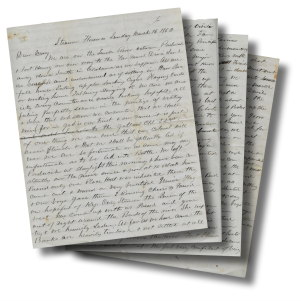
Steamer Florence
Sunday, March 16, 1862
Dear Mary,
We are on the Tennessee River between Paducah & Fort Henry on our way to the far-famed Dixie Land away down South in Alabama as we suppose. All are as careless and unconcerned as if sitting in their peaceful homes—eating apples, smoking cigars, playing cards, or writing home, talking, singing, &c. No care in anxiety, every countenance nearly looking hopeful, all feeling perfectly secure in the prestige of victory & sure that whatever we encounter that we shall win (for in God is our trust & our cause it is just) and add laurels to the gallant Old 52nd. Of one thing we are sure, that our Colonel will never flinch & that we shall be gallantly led if ever we are so fortunate—or as some may say unfortunate—as to be led into battle.
We left Paducah at daylight this morning & have been constantly on the move since & now at 10 o’clock have passed only one place that was inhabited. There they came out and waved a very beautiful Union Flag & our boys gave them 3 rousing cheers & passed on hopeful of Kentucky. One steamer—the Queen of the West—has come up with us, passed, and gone out of sight around the bends of the river—she empty & we heavily laden. As far as we have come the banks are heavily timbered & not settled at all. We have as yet seen but the one sign of civilization—the little town of which I spoke.
I am bad off today having nothing to read & my principle won’t let me play euchre Sunday. There is some prospect now of your Father’s getting in Drum Major [?]. I am doing all I can to effect it but don’t know how it may come out.
2 o’clock. We have just left the great Fort Henry & are on our onward course up the far-famed Tennessee River. We hear that there is some 10 miles above us some 90 steamers at anchor waiting for the rest of Uncle Sam’s last fleet to take their victorious march for Liberty & Union. The fort was not what I expected to see. It is not near as extensive as Fort Donelson. I saw the great rifled monster that burst at the bombardment—huge pieces of it laying around; also the great gun that was hit by a shot right on the muzzle and dismounted laying like a dead horse, heels in the air. Destruction everywhere. There is no town at all there—only a place cleared off at a bend of the river so as to rake it for a long distance. About 2½ miles below is an island behind which the gunboats got when shelling the rebellious “Individuals.” About ½ mile above on the opposite side of the river is the unfinished Fort Heiman. This is right the opposite to the other in this respect while Fort Henry is on very low land, now at high water, scarcely above the river. Fort Heiman is on a very high bluff, numerous ravines between it and the river. Uncle Sam is dismounting all the guns & leveling all the fortifications with the ground—in fact is undoing all that our friend, the secesh, have been all winter doing & that is double quick time too.
4 o’clock & we are far above Ft. Henry. We have passed 2 other places that the secesh have used as fortifications & encampments. We have just left a landing or rather a place where they landed & took about 20 rods of rail fence for wood & I went ashore & picked some plum blossoms & other green leaves (the long one is cane) which I send you as an evidence of the change of climate we have passed through since we left Chicago 4 weeks ago today. We left Smithland for Ft. Donelson today. We are again on our route from Paducah South. We are again up shore stealing secesh rails for wood. There has not been a single wood pile in sight of the river today & full we are compelled to have. Nearly all the houses along the bank, the women & men shake their handkerchiefs at us & at some display the Stars & Stripes. But some are as grim as you please. One old fellow the boys shouted at him & he shook his head as much as to say your company is not very welcome to me. The boys wanted to shoot him but we would not let them. That looks too barbarous for me. In battle there is some excuse but in cool blood to shoot down one man seems very repugnant to me, but hosts of our boys would just as leave shoot one as a dozen & in cool blood at that.
We feel very confident of being in New Orleans before another month is past & now we have got to the point where you must not expect to hear from us very often. We shall go to Savannah, Tennessee, or Florence, Alabama, & then march across to Memphis & get in the rear of the Devils while Gen. Pope with his division comes down the Mississippi & will meet us there. Gen. Buell is up the Cumberland & is pushing for the same points with 90,000 men. Our division has about 75 or 80 thousand & Pope’s about 60,000 & the 3 are altogether too much for any force the secesh can bring against us.
About hearing from us if we take the field and march, the facilities for sending letters will be very scarce & you will have to steal your heart against disappointment & long delays between letters. Two weeks may be a short time between letters after we take the field & I trust you to always remember that I will take just as good care of myself as it is possible to do & as for getting shot, that is out of the question with me. They can’t hit me. Bear up bravely & keep a stout heart & all will come out right yet & we shall live to enjoy many long years in our little quiet home. I will write as often as circumstances will permit but on the march the chances will be scarce, I tell you.
Yours lovingly, — Don
Letter 5
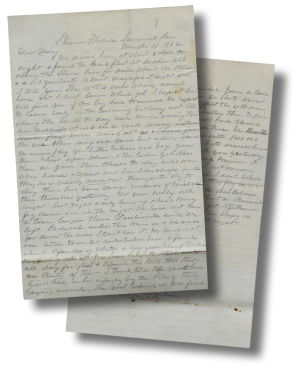
Steamer Florence
Savannah, Tennessee
March 17, 1862
Dear Mary,
We arrived here at about 6 o’clock tonight & found the grand fleet at anchor all along the shore here for miles—about 100 steamboats and 2 or 3 gunboats—a most magnificent sight now, I tell you. The 15th [Illinois] is somewhere around here but I can’t learn where yet. I expect [my brother] Orrin will find me if we lay here tomorrow. We expect to leave early in the morning but may not. All along the banks today were women waving their handkerchiefs at us & in a good many instances Union flags were waved at us & cheers for the men. When anyone came out ashore & waved the Union flag, you better believe our boys gave them cheer upon cheer & the ladies—God bless them—we them cheers today until we were hoarse & waved our handkerchiefs until they are nearly worn out.
Through the day today there had been more evidences of civilization than there was yesterday. We were nearly all night last night & only laid up when a heavy fog came on in the night. We have not seen a town larger than Clairbonville since we left Paducah unless this town is & we are so far down the river I can’t see it. We landed at one little town 25 miles below here & found about 5 families of whites & any quantities of darkies wandering about. We have had to steal rails all day for fuel & blessed the Lord that there was plenty of them. I think Old Abe must have lived here in his infancy by the piles of them laying around. The boat behind us was fired into and 2 men killed & one wounded from a cave in the bank of the river. Some 60 shots were fired at them & only 4 took effect—the fourth one killing a mule. They knew better than to fire in the Old 52nd for we would have cleared out that hole in double quick time.
Gen. Buell is only 45 miles from this place with 140,000 men & we have nearly 100,000—both armies larger than I supposed when I wrote you yesterday. We are ordered to go on to Pittsburg [Landing] tomorrow. I don’t know where that is as it is not down on any map I can find but on we go. I don’t believe we can find anyone to fight as they fly as we approach & our victorious march to New Orleans is likely to be accomplished without a skirmish. We have the grandest army ever got together in modern times & are bound to win.
I am sleepy as a fool & can think of nothing new tonight. I find there is a chance to mail this letter and so goodbye for the present. I am well as I ever was in my life. Yours in love, — Don
Jase [Jason Prindle] came down with the mumps yesterday. Is not very sick.
Letter 6
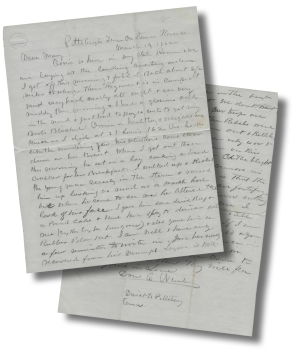
Pittsburg [Landing], Tenn.
On Steamer Florence
March 19th 1862
Dear Mary,
[My brother] Orrin is here in my state room & we are laying at the landing awaiting orders. I got off this morning & footed it back about 2½ miles to where their regiment is in camp. It rained very hard nearly all night and was very muddy this morning & I had a glorious walk in the mud & just had to pay 10 cents to get my boots blacked. Orrin is healthy & weighs as much as I did at St. Louis—162 lbs. Looks like the wandering Jew—his whiskers come clear down on his breast. When I got out there this morning, he sat on a log soaking a hard cracker for his breakfast. I walked up and kicked the young man severely in the stern & raised him up looking as mad as a March hare but when he come to see me, he altered the look on his face. I gave him some dried beef & a pound cake & made his stay to dinner with me (by the bye, he has gone) & also gave him a rubber blanket.
I am well and have only a few minutes to write in. Jase [Jason Prindle] has nearly recovered from his mumps. Legore [Prindle] is well.
We may have to lay here on the boat for a number of days yet. We don’t trust to God knows it is awful. Our troops are encamped in a place where the Rebels were until the gunboats shelled them out and killed some 40 of them. There is no town—only 4 or 5 log houses. There is not a town on this river so few of 50 inhabitants. Oh! the blight of slavery. There are various rumors in camp—the most reliable one on that the rebels, about 20,000 strong, are fortifying about 20 miles back. We know nothing yet.
Have no fears for me. I will write as often as I can & tell you all concealing nothing. If I am in danger, I will tell you so & you must place implicit confidence in all I say. As yet we are in none & I think when we come to march on them, that they will flea hence.
Yours in love, — Don C. Newton
Direct to Pittsburg, Tenn.
Letter 7
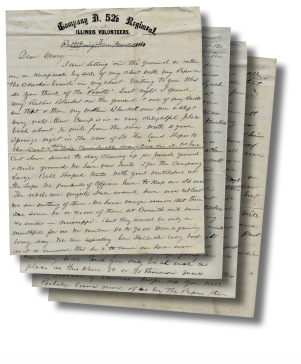
Co. D, 52nd Regt. Ill. Vols.
Pittsburg, Tenn.
March 21, 1862
Dear Mary,
I am sitting on the ground or rather on a knapsack by side of my chest with my paper on the checker board in my chest writing to you. What do you think of the “posish?” Last night I spread my rubber blanket on the ground & one of my quilts on that & then my woolen blanket over me and slept very well. Our camp is in a very delightful place back about ½ mile from the river with 2 good springs right in the rear of it. The land slopes to the East & there is some considerable many trees on it. We have cut down several today clearing up for parade ground & drill ground. We have new tents—5 for the company—large bell-shaped tents with good ventilators at the tops. We poor devils of officers have to keep our old ones.
The rebels are mighty scarce around here now—at least we see nothing of them. We hear vague rumors that there are some 30 or 40,000 of them at Corinth out some 40 miles in Mississippi. But they would be only a mouthful for us. We number 80 to 90,000 men & gaining every day. We are expecting Gen. Halleck every boat as it is rumored that he is to come on here soon.
Our Colonel is promoted to Acting Brigadier General in Gen. Smith’s Division. His brigade consists of the 52nd, 50th. 57th, 58th, & 7th Illinois Regiments & the 8th Iowa. The 7th Illinois has 2 companies in it from Kane County, one from Aurora & one from Elgin. The 58th has one or two companies from Kane County & the Colonel is from Elgin. His name is Lynch. The 50th was stationed at St. Jo with us & afterwards at Smithland. The 8th Iowa was at Smithland also at one time so that altogether we are kind of old acquaintances.
[My brother] Orrin was down to see me today. He is in Gen. Hurlbut’s Division & I don’t know what brigade. There are one or two Indiana & Ohio Regiments in the same brigade. He is as fat & healthy as he can well be—happy as a clam for anything that I can see. Seems to rule the roost over in his regiment. Singular isn’t it—that we two should meet way down in the woods in Tennessee for it as all woods as far as I have been around here—not very thick but so that we have to cut all our roads & clear the way for Old Kaintuck.
Our boys are peculiarly happy tonight, singing all kinds of songs & hymns, laughing, telling stories around their grand old camp fire. There is a grand sight here tonight—cap fires burning all through the woods, drum beating, roll callings going on on every side. Could you only be at such a place as this where 80 or 90 thousand were disembarking, you would not wonder at the slow movements of the grand army. Why we have been hard at work for 2 days with our one regiment & have not got much more than ½ done & only moved ½ mile from the boat & we had to lay on the boat 2 days before we could get a chance to land & some regiments have laid on 4 or 5 days before getting a chance to land. All the boats but 4 or 5 have left here which seems to indicate that we have got to foot it from here & some prospect that we shall not have transportation enough for our baggage. What will a poor fellow do without his “chist” & have to carry a knapsack. Oh what a fall for a Captain. At any rate, we have got to take foot and walker’s line for some place—Memphis we suppose. I wish we had some way of finding out the news. I wish when you write you would tell us the latest news—whether our troops have attacked Richmond or not, or Memphis. we can’t find out anything now only be letter from home & then we don’t expect to get very often. We haven’t had a mail since we left St. Louis & don’t know when we write whether you are going to get the letters or not. But of course we hope so. You will probably learn more of us by the papers than we can tell you and sooner.
Jason [Prindle] has the mumps & is not very well. All the rest of us are well. All the Batavia Boys that are with us are well but Jim Kelly & I don’t believe he is very sick.
After we start from here you may not get letters from us in a long time but never fear. Carl knows enough to take care of himself every time & will look out for himself & for the rest. He bites much hard bread now-a-days & is satisfied. Keep your spirits up as well as you can & trust in the all-wise Providence that overrules all things for good & be assured he will look out for me every time. I have the utmost confidence that all will come out right & that I shall live to come home & enjoy the yet to come happiest part of my life with my wife & Baby May. God bless & take care of her & you until my safe return.
Yours in love, — Don
Love to all the friends.
Letter 8
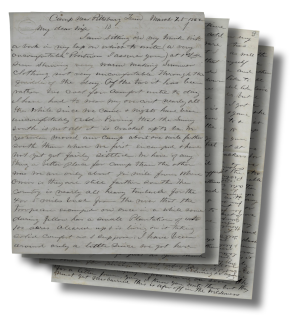
Camp near Pittsburg, Tenn.
March 25, 1862
My dear wife,
I am sitting on my trunk with a book in my lap on which to write (a very “oncomfortable” position, I assure you) at 1 o’clock, sun shining very warm making summer clothing not very uncomfortable through the middle of the day. Of the two, it has been rather too cool for comfort until today. I have had to wear my overcoat nearly all the while since we came & nights have been uncomfortably cold proving that the Sunny South is not all it is cracked up to be.
We yesterday moved our camp about one mile farther south than where we first encamped & have not yet got fairly settled. We have if anything a better place for camp than the other was. We are only about ½ mile from where [my brother] Orrin is. They are still farther south. The country is nearly all heavy timbered for the 4 or 5 miles back from the river that the troops are encamped on. Once in awhile some daring fellow has small plantation of 40 to 100 acres cleared up & is living on it taking solid comfort, I suppose. I have been around only a little since we got here, having been too busy most of the time to get away.
I have caught a very severe cold & today have a headache—a very rare thing for me, but I don’t think but what I can take down any headache or cold that ever tackled me. We are sleeping on the ground. Beds are played out down here. I spread down my rubber blanket & 2 quilts I carry with me & then put my woolen blanket over e & go it very comfortable—only how hard the ground is. I think sometimes of the fellow skating how cold the ice is. My hips begin to resemble the shoulders of a camel who has run a long time on ship board—badly calloused. I feel as the old fellow in the Mexican War did [when] he said he had fought, died & bled, laid on the cold ground and sweat, and almost suffered. I lay sometimes & long for the hard old mattress & our nice little bed room.
By the bye, I received a letter from you yesterday dated March 8th—16 days old, but new to me. You wanted to know what to do about letting Colton have the house at 10/. Do just as you have a mind to & it will suit me. I am always suited with what you do. You and Father may do with my things just as you think best & all will be right. I am no longer my own man. I belong to Uncle Sam & you two ought to be able to attend to my business as well as I could do were I there to do it myself. I feel just like devoting all my time and attention to my country but should like to hear from home & I suppose you would like to hear from me oftener than you do. But out here mails &c are mighty uncertain. I got a Chicago Tribune of the 20th yesterday & gave for it 25 cents, read it all I wanted to, and sold it for 20 & it was again sold for 18. What do you think of that up there where you get them for 2 or 2½ cents each?
Crackers are 20 cents, butter 40 cents, cheese 25 cents, eggs 25 cents & all other things an officer has to buy is at the same rates. I live on hard crackers, salt sow’s belly, beans & suck like. Occasionally I eat some of the cake you or rather Mother was so kind as to put up for me.
Playing soldier is played out. It is now the real thing here. I see no prospect of a fight. Our scouts have been out 45 miles toward Corinth—or rather north & east of it—and found all deserted. We think here that id Island No. 10 surrenders, they are goners sure & will make no more stands—only keep up a kind of guerrilla warfare all over the South for perhaps a long time.
Evening & I again resume my pen. Orrin, Ben Stephens, & Smith [of the 1st Illinois Light Artillery] called on me this afternoon. They are all well & send their love to you. Sam Canfield has been under the weather ever since we left Chicago. All the rest are well as usual. Jim Kelly has resumed duty & I believe is as well as usual. Something is on his mind & I don’t know but what you wrote me is true. He says not. I had a talk with him about it and he denied it in toto.
I am better of my cold tonight. Went out this afternoon & drilled two hours & got up a sweat & felt better right off. Capt. [Nathan P.] Herrington [of Co. F] & Capt. [Alvah P] Moffat [of Co. H] have each sent in their resignations & will probably come home in a few days. As for me, I had rather be shot than to resign now we are in the only service we have seen. It looks too much like cowardice but they have both been unable to take charge of their companies nearly all the time since they have been in service & perhaps that will excuse them. I would give as much as any other man could to have this unholy war—or rather rebellion—come to an end & we once more allowed to come to our peaceful homes to enjoy the societies of our families. Friends we have all around us now. Everyday we find new ones, acquaintances almost everyday call on me. Mike Faninger & one of the Blackman boys called today. Also several acquaintances from Aurora & Elgin, some from Geneva. Almost all of Illinois is here and a good many from other states. We only lack the 36th [Illinois] to have nearly all of the Kane County Boys.
A mail today & 4 letters but none from you. One from Latham saying saying he was coming on soon. Oh for a letter from you. I know you write them but they must get miscarried. This is a far off in the wilderness but I go to bed hoping for better luck in the next mail. My last from you was dated the 8th and Latham’s was the 16th—8 days later. No news here to write—only that I am gaining strength & health everyday. Yours in love. Tell me all about Baby May in your next. Ben thought she was a gay little bird from her picture & complimented me very highly on her fine looks. Kiss her for me. Would to God I was near enough to do it for myself. I suppose she must run around by this time. How cunning she must look. As soon as she gets old enough, learn her to call me by looking at my picture so se will know me when I come home again. Lovingly, — Don
Letter 9
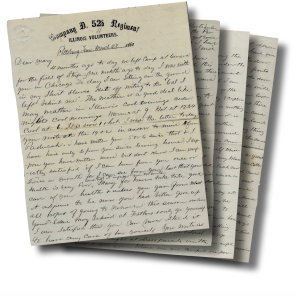
Pittsburg, Tenn.
March 28, 1862
Dear Mary,
Four months ago today we left camp at Geneva for the field of strife. One month ago today I was with you in Chicago. Today I am sitting on the ground in my shirt sleeves, hot off writing to the “Gal I left behind me.” The weather is a good deal like May weather in Illinois—cool evenings, cooler nights, cool mornings, warm at 9, hot at 12 & 4, cool at 6. It is now 1 & hot.
I received the letter today you wrote on the 19th & 21st in answer to mine from Paducah. I have written you 5 or 6 since that & I have had only 2 from you since leaving home. I suppose you have written more but don’t know. I am perfectly satisfied if I can hear from you once or twice a month for I can see from your last that your health is very poor and that it injures you to write. Mary, for Heaven’s sake, take good care of your health & unless you gain from what it appears to be now, you had better give up all hopes of going to Nebraska this season unless you leave May behind at Father’s & only go yourself. I am satisfied that you can never stand it to have any care of her yourself. You write as if May had been sick but say nothing in particular about it. So I suppose you have written me the particulars in some other letter that has not yet come to hand. We get but 2 mails a week now & I have learned to wait patiently for news from you. I wish you would state to me in your next exactly how you are & what your prospects are for health this summer. Do you get any better sine I was there at Chicago, or do you continue about the same. I fear sometimes I may never see you again—that you will gradually fail & pass away to the Heaven above before I get home. God grant you may be spared to me to make my home happy as I years gone by. That for long years to come I may ever meet that same happy smile upon my arrival at my cottage home & that content & happiness may ever be our lot as in years gone by.
Saturday noon. 6 o’clock. I have just come in from drilling my company. I have drilled ½ hour this morn. Orrin stayed with me last night in my cotton house. He is going to stay to breakfast. You ought to see him. He weighs as much as I do and is black as a mulatto & best of all, won’t drink a drop. Smokes an old black pipe though constantly. Whiskers come clear down on his breast, mustache 3 inches long, and looks as if he had a mule’s tail for a roof over his mouth.
The Colonel complimented me last night at rest parade on having the finest drilled company making the best appearance on dress parade, being under the best discipline of any company in the regiment. I have had the same compliments before but I am trying to keep ahead.
Noon again. I am officer of the day. My turn seems to come pretty often [with] only 8 captains for duty so I come every 8 days. Well there is nothing to do today so I can lay in the shade for it is hot although there is quite a breeze & it is rather cloudy of the two. We lay here just as unconcerned as at our homes. Orrin was out 4 or 5 miles in the country yesterday trying to find a horse for himself which the Colonel promises to feed for him if he can steal one anywhere. They seem to make quite a pet go him. The thing we lack most here is communication with the outside world which as the Indian said of the White man is mighty uncertain.
Troops continue to arrive. Four or five regiments came yesterday all day. Our brigade is all here now & we think we may be ordered on soon. We have a lovely camp & I hate to leave. There is quite a difference in the appearance here from what it was when we came. The woods are getting thinned out and large fields are being cleared up for parade grounds &c. 100,000 men cut timber awful fast, I tell you. Where we are camped, one, perhaps 2 or 3 acres, there has been at least 100 trees cut down & the stumps all grubbed out. In our street we have one large oak & right in front of my tent each side the door 2 large ones same as this draft [sketch] & my tent fronts the east & the street of the company. Looking out the door now he boys are running around barefoot, shirts wide open, nothing but shirt & pants on.
I suppose from your last that you must be experiencing different weather up there in Greenland. Bah! Snow 1 foot deep. Why don’t you come down here in Dixie? We don’t think much of the land—it is just the color of the butternut breeches. Everything here is that color. The dogs are butternut, the hogs the same, everything the same color. I thought the native Missourians a curiosity but the Clay eaters around here are a great ways ahead of them in everything.
I see you have Mr. Colton in our house. Well I am well-suited. See that they take good care of the house and grounds. I want to have them build a neat fence between Charlie Wright & me & also take good care of the small fruit & garden. I had rather pay them something for taking extra care of things than to have all go to rack and ruin. I want a fence anyhow in the front yard between Charlie & me & that right off. If you conclude to go to Nebraska and leave May behind, let me know at what time you want to go. I want Father to pay Henry Pierce at Geneva $10 for me. I forgot it before. Take his receipt. I will write again soon.
Yours lovingly, — Don
Letter 10
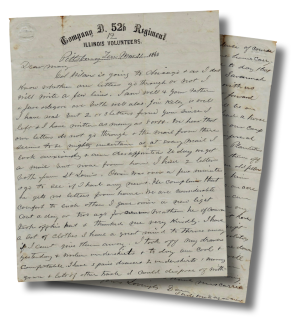
Co. D, 52nd Regt. Ill. Vols.
Pittsburg, Tenn.
March 31, 1862
Dear Mary,
Col. Wilcox is going to Chicago & as I don’t know whether our letters go through or not. I will write a few lines. I am well & your Father & Jase [Jason] & Legore [Prindle] are both well also. Jim Kelly is well. I have received but 2 or 3 letters from you since I left & I have written as many as 8 or 10. We hear that our letters do not go through & the mail from there seems to be mighty uncertain asa at every mail I look anxiously & am disappointed. Today we got a mail but none from home. I have 2 letters both from St. Louis.
Orrin was over a few minutes ago to see if I had any news. He complains that he gets no letters from home. We are considerable comfort to each other. I gave Orrin a new light coat a day or two ago for warm weather. He of course took off his hat & thanked me very kindly. I have a lot of clothes I have a great mind to throw away if I can’t give them away. I took off my drawers yesterday and woolen undershirts & today am cool & comfortable. I have 3 pairs drawers, 2 undershirts, 1 morning gown, and lots of other trash. I could dispose of without inconvenience.
We are full of confidence of course that we shall come out victorious & come home carrying our heads high. We have intelligence today that Gen. Buell is within one day’s march of Savannah with his division & will soon be here with us & I suppose then we shall make the great forward movement. We used to hear of only it will be on the Tennessee instead of the Potomac.
I had a horse yesterday and rode out about 4 miles from our camp. I found the woods all alive with the infernal Yankees. I passed several cotton plantations but saw no negroes. They have either run them off or the Yankees have appropriated them. One old fellow said he had 2200 acres, he reckoned. I asked him how much it was worth. He said about $10 an acre, I reckon. I reckoned it want one thing you can rest assured of when Uncle Sam gives me my Land Warrant of 160 acres, I shan’t locate it here. I wouldn’t take all I have even as a gift. I want you all to write a good long consolatory letter to a fellow as it is damned lonesome down here. I have no more time tonight. I will write to let you know we are all well & doing well & for fear our letters have miscarried.
Yours lovingly, — Don
I will write again soon.
[Editor’s Note: The following extracts are from a letter written by 17 year-old Karl [Charles] Gross (of German descent) who served in Co. B, 52nd Illinois Infantry and was killed at Shiloh. He wrote the letter to his parents in German. It was discovered in a safe deposit box in Mendota, Illinois, in 1990. The roster states that he was from Perkins’ Grove in Bureau county, Illinois.]
“We steamed down the Mississippi River to Karo, [Cairo, Illinois]. There we arrived the evening of the 15th at five o’clock. Then we went up the Ohio River to Kentucky where we arrived during the night at 1 a.m. From there we took to the Tennessee River upstream.”
They stopped for 15 minutes at Fort Henry, taken for the Union just a month before by Grant, then a little known general. Grant was Karl Gross’s ultimate commander. The boy notes in the letter that he had seen Grant pass them on the trip south. Finally, at 7 p.m. on March 19 the steamboat Florence pulled into Pittsburg Landing, Tenn. Young Karl was amazed at the sight of the big river boats coming and going:
“Here I counted 40 steamboats. I must have seen at least close to 75, although I wasn’t able to count them all.”
After a night on the boat he was put ashore and the tent camp established. Gross estimated there were 80,000 to 100,000 men “with more regiments still on the way.”
Camp life did not displease him. Gross found the food, “adequate, I guess, the crackers (hardtack) though I don’t care for. When I eat one-eighth of it I am full.”
For now things were tranquil:
“We are lying in Peace and quiet, and I don’t believe that an attack will come. We don’t sense any danger here, and I feel as secure as if I were on our own homestead. So far I have not regretted joining the military for it is here that you see and hear things.”
Karl Gross was deeply touched by the natural world around him. Spring had come to the Tennessee countryside and he was alive to it:
“The woods (forest) consist of willows and red fir … The weather is nice and warm, the woods start getting green, the plum trees are blooming and the birds are singing. One could join their song. It is the sound of creation: the wind in the trees, … the cheerful noise of the birds, music in the air. I only wish Pa could be here to experience all this.”
But a good part of Karl Gross’s letter deals with his parents concern about his safety.
“Dear parents, I beg of you, do not worry unduly about me, even though we must go to a battlefield. As you know, our Heavenly Father carries our lives in His hands even there. And despite being in the midst of cannon thunder while bullets fly (hiss) to our right and left, He can save us nevertheless. And should it be God’s will to summon me from the battlefield so his will be done. Because, dear parents, how blessed shall we be there, where neither sorrow nor war exists, but eternal peace and happiness instead.”
Finally it was time to close.
“Take care, all of you who haven’t forgotten me completely. Just a moment ago a list was passed around for information to reach the families in the event we get wounded or killed. They wanted to know your name and address and what church I belong to. Take care and do not worry. Please write soon.”
It’s not known how Karl Gross died at Shiloh, or how Elizabeth and Nicholas Gross got the word of their son’s death. But for the next 129 years his letter passed down from from one generation to another until it came to rest in the Mendota, Ill., safe deposit box. His story is a slice of American history one that many families could tell, and his words echo into our time.
[See Buried Treasure: Ancestor’s Letter from Civil War by Frank Whelan]




























